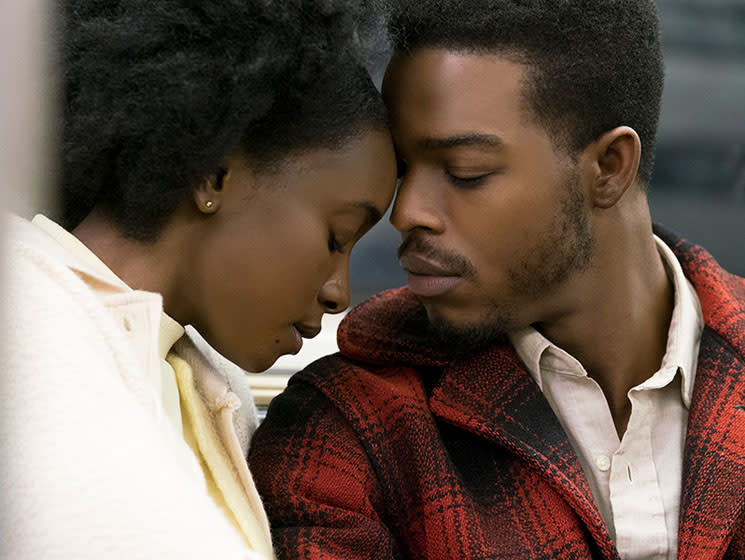Moonlight director Barry Jenkins is about to break our hearts all over again with another gripping tale of black love. Adapting James Baldwin's novel of the same name, If Beale Street Could Talk charts the relationship of Tish Rivers (Kiki Layne) and Fonny Hunt (Stephan James), lovers torn apart by a racist cop, who puts an innocent Hunt in prison while Rivers deals with her pregnancy.
In the age of Black Lives Matter and Donald Trump's presidency, Baldwin's 1974 novel is as relevant as ever, and Jenkins stays faithful to the source material for another resonant, powerful entry to his strong body of work, furthering his reputation as one of modern cinema's most vital directors. Jenkins' steady directorial hand and simple styling allows the film to simply haunt, presenting an all-too-familiar reality and letting it linger.
Hopping around before and during Hunt's incarceration, Layne and James are the film's anchors with their stellar performances, running the gamut from doe-eyed love to soul-crushing heartbreak. Both deliver star-making turns that will surely mark turning points for their burgeoning careers for years to come. The story navigates between the high of unbridled, reciprocated love and the low of being falsely punished for a crime, crushed under the weight of seemingly uncontrollable factors, and Layne and James embody each facet of these emotional worlds with plenty of heartbreaking emotional richness.
But as devastating as the film's subject matter is, there's a powerful undercurrent of hope, tenderly conveyed in all aspects of the film. Layne and James' multifaceted performances never lose their emotional depth, bringing forth plenty of warmth and belief to the grimmest of scenes, and this is what makes Beale Street a vital counterpoint to the seemingly endless stream of fraught headlines that mark today's tumultuous times. There's plenty of tragic moments in Beale Street, but Jenkins won't let you call it a tragedy. It's about hope and love.
Jenkins hammers these messages home by reuniting with some of the key behind-the-scenes contributors to Moonlight's historic Best Picture win in cinematographer James Laxton and score composer Nicholas Britell. Laxton who takes a similar head-on, slow-burning approach that again finds the characters staring deep into the audiences' souls, but swaps out Moonlight's oceanic blues and greens for an oaky brown palette. Britell's score augments the warmth with rich, sweeping strings.
On all fronts, If Beale Street Could Talk is a triumph, carrying its tragic weight with poise and assuredness. It's a heartbreaking look at an all-too-real phenomenon that looks deeply, deeply inward to find a lot of joy. It's an emotionally complex, culturally relevant film that is bound to resonate.
(eOne)In the age of Black Lives Matter and Donald Trump's presidency, Baldwin's 1974 novel is as relevant as ever, and Jenkins stays faithful to the source material for another resonant, powerful entry to his strong body of work, furthering his reputation as one of modern cinema's most vital directors. Jenkins' steady directorial hand and simple styling allows the film to simply haunt, presenting an all-too-familiar reality and letting it linger.
Hopping around before and during Hunt's incarceration, Layne and James are the film's anchors with their stellar performances, running the gamut from doe-eyed love to soul-crushing heartbreak. Both deliver star-making turns that will surely mark turning points for their burgeoning careers for years to come. The story navigates between the high of unbridled, reciprocated love and the low of being falsely punished for a crime, crushed under the weight of seemingly uncontrollable factors, and Layne and James embody each facet of these emotional worlds with plenty of heartbreaking emotional richness.
But as devastating as the film's subject matter is, there's a powerful undercurrent of hope, tenderly conveyed in all aspects of the film. Layne and James' multifaceted performances never lose their emotional depth, bringing forth plenty of warmth and belief to the grimmest of scenes, and this is what makes Beale Street a vital counterpoint to the seemingly endless stream of fraught headlines that mark today's tumultuous times. There's plenty of tragic moments in Beale Street, but Jenkins won't let you call it a tragedy. It's about hope and love.
Jenkins hammers these messages home by reuniting with some of the key behind-the-scenes contributors to Moonlight's historic Best Picture win in cinematographer James Laxton and score composer Nicholas Britell. Laxton who takes a similar head-on, slow-burning approach that again finds the characters staring deep into the audiences' souls, but swaps out Moonlight's oceanic blues and greens for an oaky brown palette. Britell's score augments the warmth with rich, sweeping strings.
On all fronts, If Beale Street Could Talk is a triumph, carrying its tragic weight with poise and assuredness. It's a heartbreaking look at an all-too-real phenomenon that looks deeply, deeply inward to find a lot of joy. It's an emotionally complex, culturally relevant film that is bound to resonate.
